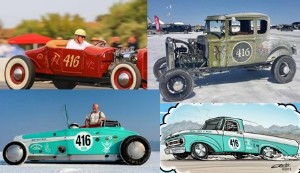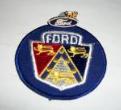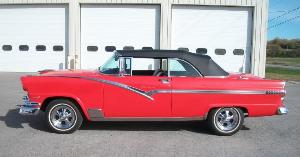|
Author
|
Message
|
|
Outlaw56
|
|
|
Group: Forum Members
Last Active: Last Year
Posts: 436,
Visits: 26.9K
|
I have read a lot about converting the road draft tube from the side of the block to the back of the valley cover. From the valley cover, the road draft modification is routed thru a pvc valve and into several options to include base of carb or intake. Would this not just route a lot of contamination into the intake? It makes sense to get rid of the mess created by the road draft tube, but not to vent it into the carb or intake manifold. What am I not understanding? This inquiry is not about how to do the modification, but rather why its done this way. Darrell Howard Whitefish, MT Outlaw 56
Darrell Howard Whitefish, MT Outlaw 56 Ford F-100's
|
|
|
|
|
mctim64
|
|
|
Group: Forum Members
Last Active: 7 Years Ago
Posts: 2.4K,
Visits: 5.0K
|
PCV valve is an emission control device, back in the day a road draft tube was all you needed to clear the engine of the gasses that build up. The EPA does not like it when anything like raw fuel or oil is vented directly into the atmosphere. So with the PCV it is directed into the engine to be burned and then to the atmosphere. I have found that the PCV is not enough in the Y, at high RPM and full throttle there is no vacuum, so I still run a road draft tube along with a PCV valve.
 God Bless. God Bless.  Tim http://yblockguy.com/ Tim http://yblockguy.com/
350ci Y-Block FED "Elwood", 301ci Y-Block Unibody LSR "Jake", 312ci Y-Block '58 F-100, 338ci Y-Block powered Model A Tudor
tim@yblockguy.com Visalia, California Just west of the Sequoias
|
|
|
|
|
crenwelge
|
|
|
Group: Forum Members
Last Active: 2 Years Ago
Posts: 512,
Visits: 1.7K
|
Back in the 50's when we still used gas powered trucks, we ran a hose from the road draft to a hole cut in the top of the of the air cleaner with no pcv valve. Vacuum goes up at the top of the air cleaner at higher rpm's even though manifold vacuum drops to nothing. I don't remember if this was offered from the factory but there were after market kits. Back in those days it was common for a truck to drop down to 10 mph while climbing a hill and of course cabs were not very air tight. Without this type of ventilation a driver would get tears in his eyes from the fumes. The ventilation eliminated it completely.
Kenneth
Fredricksburg, Texas
|
|
|
|
|
DANIEL TINDER
|
|
|
Group: Forum Members
Last Active: Yesterday
Posts: 1.7K,
Visits: 154.3K
|
With a T-Bird style draft tube/PCV combo, mixture dilution/excessive crankcase pressure at high RPMs might be avoided, but majority running time with normal, high-manifold-vacuum cruising would allow unfiltered crankcase air supply, since the more restrictive filler-cap air filter would likely divert the manifold vacuum/PCV supply flow ? Keeping corrosive fumes flushed out of the crankcase will prolong oil/engine life, but isn't replacing it with dirty air is sort of like; two steps forward-one step back?
6 VOLTS/POS. GRD. NW INDIANA
|
|
|
|
|
crenwelge
|
|
|
Group: Forum Members
Last Active: 2 Years Ago
Posts: 512,
Visits: 1.7K
|
The blowby is really not that dirty. It is laden with an oily mist that actually seemed to keep the carbon off the intake valves.
Kenneth
Fredricksburg, Texas
|
|
|
|
|
Ted
|
|
|
Group: Administrators
Last Active: Yesterday
Posts: 7.5K,
Visits: 205.9K
|
Outlaw56 (2/25/2009)
This inquiry is not about how to do the modification, but rather why its done this way.The road draft tube concept was effective but not without problems of which the more significant would be emission deposits into the atmosphere as well as placing a large amount of oil on the roadways. The oil on the roadways was not only deemed a hazard for driving but a concern to the environment as enough oil was being deposited to make its way into the soil and waterways. The incorporation of the Positive Crankase Ventilation (PCV) system in the early Sixties provided a simple and effective solution to the aforementioned problems. Most PCV valves will move approximately 3 cfm of air during normal driving and up to 6 cfm of air under higher load conditions. PCV valves are tailored for specific engine combinations (usually by cubic inch) and as such, care must be taken when retrofitting these valves to engines not originally equipped with PCV systems in that the sizing of the PCV valve must be considered. A side benefit to the PCV valve system is that the crankcase is under a light negative pressure during cruising which in turn minimizes oil leaks that would be present otherwise. Utilizing a road draft tube in conjunction with a PCV valve negates many of the benefits of using a PCV system.
  Lorena, Texas (South of Waco) Lorena, Texas (South of Waco)
|
|
|
|
|
Outlaw56
|
|
|
Group: Forum Members
Last Active: Last Year
Posts: 436,
Visits: 26.9K
|
So if I were to use the original road draft tube AND a PVC valve, here is my question. The valley cover I have is for a 256 Yblock. It has a fitting on the back which appears to be for a PVC Valve. I am installing an Edelbrock Thunder Series Carb. The front of the carburetor has a port that is labled "Manifold Vacum Signal" for PVC valve. Is this where I would make the connection from the valley cover to the carburetor with the pvc valve somewhere in between? Not sure what Edelbrock is talking about when they refer to "Manifold Vacum Signal". I also have the option of hooking up dual fuel feed fuel input to each side of the carburetor, but I do not think this engine really needs that option. Nay ideas what purpose a "dual feed" carb would serve? Darrell Howard Outlaw 56
Darrell Howard Whitefish, MT Outlaw 56 Ford F-100's
|
|
|
|
|
oldcarmark
|
|
|
Group: Forum Members
Last Active: Last Month
Posts: 3.7K,
Visits: 32.6K
|
The opening in the valley cover will take a grommet which you can buy at most auto parts stores.Measure the diameter of hole and get the correct size grommet.The PCV valve goes into the grommet and then run a fuel line type hose from it to the fitting on carb.Make sure the oil filler cap is clean and that air can be drawn in through it.If you really want to do a closed system get a cap with hose fitting on it and run hose to air filter.You can plug the hole in side of block where draft tube was using a frost plug and grinding a flat spot on each side where the bolts can hold it on block.Thats how I did my 56 292.The dual feed option is for high performance use where you need a constant supply of fuel quickly to feed the primary and secondary fuel bowls instead of feeding the secondary bowl from the primary with the transfer tube.
 
|
|
|
|
|
miker
|
|
|
Group: Forum Members
Last Active: Last Month
Posts: 1.9K,
Visits: 194.9K
|
I was told that the PCV system was originally use on milk and ice delivery trucks, as they didn't put on enough high speed (25mph) miles is the city to make the draft tube work. Some of still drive like that due to traffic. I did a PVC on an older car, and didn't provide enough intake air under heavy vacuum (from the oil fill tube on a Y block, or a plugged oil fill cap), and on a long downhill stretch with high manifold vacuum, I sucked one valve cover gasket into the motor, and then spilled oil all over the exhaust manifolds. Makes a lot of smoke. Not enough PCV valve and hose will blow them out, so pick a valve from a like sized motor. You should also consider a baffle on the valley cover, I had one motor pick up enough oil off the dist. gear to get it into detonation (it was a blown motor), and take out the head gaskets. Still, I run closed PCV's on both my Y's, and also on the old scrub.
miker
55 bird, 32 cabrio F code
Kent, WA
Tucson, AZ
|
|
|
|
|
Ted
|
|
|
Group: Administrators
Last Active: Yesterday
Posts: 7.5K,
Visits: 205.9K
|
Outlaw56 (2/28/2009)
So if I were to use the original road draft tube AND a PVC valve, here is my question........... I did the same as Mark as I simply put an expansion plug in the road draft tube hole of the block when I installed the PCV system. I did cut the small oil drain tube off of the road draft tube assembly and reinstalled the modified assembly back on the engine for appearance purposes only as the road draft tube itself is totally non-functional now. Doing a search on this site regarding road draft tubes comes up with an inordinate number of queries around the oil leaks from these tubes and that alone is enough to warrant getting them off of the engines or making them non-functional as I did.
  Lorena, Texas (South of Waco) Lorena, Texas (South of Waco)
|
|
|
|